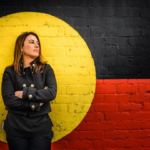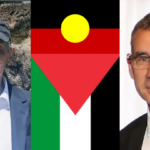The Thorpe-Payman Red-Lines Package Puts Genocide on the Agenda for 2025

The final sitting day of federal parliament on Ngunnawal Country in Canberra was notable this year, due to its focus on the international criminal offence of genocide.
Parliamentary proceedings on 28 November 2024 were supposed to commence with a vote on legislation that Senator Lidia Thorpe’s introduced in February, which seeks to remove a mechanism requiring the federal attorney general to approve any prosecution of the offences of genocide, war crimes and crimes against humanity that sit under division 268 of the Criminal Code Act 1995 (Cth).
The Gunnai, Gunditjmara and Djab Wurrung senator, however, had been suspended from parliament the night prior, and an attempt by Greens Senator Mehreen Faruqi to introduce Thorpe’s second reading speech on her private members bill was prevented.
Urgency around prosecuting genocide hit fever pitch earlier this year, in response to the onset of the Gaza genocide in October 2023, as questions were being raised in regard to the blank cheque our government had been providing Israel as it is perpetrating a colonial massacre, and it was Thorpe’s bill that served to reveal to the public that the AG can block justice in this regard.
Last week’s delay in the Thorpe bill is simply that, however, as when parliament reconvenes, the legislation will still be there, while the issue of genocide is set to be front and centre, as while Thorpe spent the 28 November hosting the End to Genocide rally outside parliament, Senator Fatima Payman introduced the Genocide Red-Lines Package of legislation on behalf of them both.
The worst of all crimes
“The first of my genocide bills is about allowing victims to seek justice against perpetrators in Australian courts, by removing the attorney general’s power from blocking such cases,” Senator Thorpe told Sydney Criminal Lawyers this week.
Introduced on 7 February 2024, the Criminal Code Amendment (Genocide, Crimes Against Humanity and War Crimes) Bill 2024 seeks to remove a legal mechanism known as the ‘attorney general’s fiat’, which requires the nation’s chief lawmaker to make a decision on whether to permit a genocide prosecution to proceed or whether to block it.
The interest in prosecuting genocide has spiked since apartheid Israel began perpetrating the Gaza genocide 14 months ago.
The issue regarding the block on prosecuting genocides has long been recognised, however, as the AG’s fiat was used to block a 2018 attempt to prosecute then Myanmar state counsellor Aung San Suu Kyi, while in 2011, an attempt to prosecute then Sri Lankan PM Mahinda Rajapaksa over genocide was too prevented from going ahead.
The AG fiat most significantly serves to block any attempt to prosecute the crime of genocide against the First Peoples of this continent.
And Krautungalung elder Uncle Robbie Thorpe has long been aware of this prevention against seeking legal recourse in regard to genocide and he’s long battled it.
The red-line bills
As for the Genocide Red-Lines Package of legislation that Senator Thorpe has delivered in conjunction with Senator Payman, she explained that the three bills are “about stopping this country from fuelling war and genocide”.
“This package creates much stronger transparency and accountability around this country’s role in the manufacture and supply of weapons,” Thorpe continued, “and it creates new restrictions around trade and exports, to prevent the fuelling of genocide and other violations of international law, and, ultimately, our complicity in it.”
The Genocide Risk Reporting Bill 2024 is the first piece of legislation in the package. Similar to the Modern Slavery Act 2018 (Cth), it creates a genocide reporting requirement for businesses to ensure that they’ve countered risks of genocide practices being involved in operations and supply-chains, with accompanying penalties applying. And it would also establish an Anti-Genocide Commissioner.
Payman explained on introducing this bill that “the risk of Australian businesses being connected, either directly or indirectly, to genocide remains a real and present danger”, and without these laws “Australian businesses and government entities may inadvertently or even deliberately become involved in supply chains that contribute to genocide”.
As for the Treasury Laws Amendment (Divesting from Illegal Israeli Settlements) Bill 2024, Thorpe outlines that it “stops financial investments from Australia’s sovereign wealth fund, and from registered charities, in companies operating in illegal Israeli settlements”. And this system would utilise a UN database to identify which companies are open in occupied Palestinian territory.
“War and genocide are big businesses, but we should not accept this,” the senator underscored. “No one should profit or benefit from violence and war.”
The final piece of legislation making up the Genocide Red-Lines Package is the Defence Trade Controls Amendment (Genocide, War Crimes and Crimes Against Humanity) Bill 2024, which is legislation that broadly takes aim at the government’s Defence and Strategic Goods List, which contains goods, software and technology products that can’t be exported without a permit.
As Payman explained on tabling the bill, it prevents the defence minister “from granting export permits for Australian-made weapons, military equipment or technology that may be used in the commission of serious violations of international law, including genocide”.
And in terms of the entire package of bills, Payman outlined that they seek to ensure Australia meets it’s “legal obligations including the Fourth Geneva Convention” and the Genocide Convention, while she also explained that the bills are “an essential step in ensuring comprehensive action to uphold human rights and foster accountability and bringing about the end to the era of genocide”.
“A wave of First Peoples rising”
The Genocide Red-Lines Package was not only introduced into a parliament established on unceded First Nations land, at a time when the mass killing of Indigenous Palestinians is taking place, but the legislation too appears at the same time that “a wave of First Peoples around the world”, as Thorpe put it, are “rising up to dismantle colonial institutions that inflict harm on people and the planet”.
This uptick has been seen amongst the outpouring of the global Free Palestine movement, which is led by Palestinians. This is also apparent in the ongoing uprising of the Kanaky people on the French-run island of New Caledonia and it too can be found amongst the Māori people in New Zealand parliament and on the streets of Aotearoa, as they rise against ultraconservative political forces.
“First Peoples are increasingly seeing our struggles as collective and connected. I feel that solidarity is building, and more than ever, we’re standing together to fight for our collective liberation,” Senator Thorpe told SCL.
“First Peoples from across the world have reached out to me wanting to connect and to stand up against colonisers with a united front,” she underscored.
“From Palestine to Kanaky, Aotearoa, West Papua, Canada and the US – we are seeing our fight as First Peoples as one fight.”
Thorpe herself has played a prominent role in this global rise, as on 28 October, right after so-called king Charles Windsor III had addressed the Great Hall at Parliament House in Canberra, the senator rose and approached the stage, calling out to the British monarch that he was not her king nor that of her people. And the footage of the challenging of the king’s authority went global.
Parliament then censured Thorpe. However, she tore up the motion, asserting that it meant nothing to her. And last week saw the senator further seek to establish an inquiry into racism at federal parliament and push back against an attempt by One Nation Senator Pauline Hanson to challenge Senator Payman’s right to be in the chamber, which then led to Thorpe’s subsequent suspension.
Senator Thorpe has further defiantly taken all the Australian parliament reproaches against her as ‘badges of honour’, and she went on to convey on Thursday this week that “the wrongs of the past are coming to the surface and it feels like we’re at a precipice.”
“There is a real opportunity right now to work together for a world that is built on solidarity and care,” she continued.
“But we also see the way that colonial institutions are panicking and pushing back on this resistance and truth telling. Like me, Hana-Rawhiti Maipi-Clarke was suspended from parliament in Aotearoa for standing up to racism and violence against her people.”
Maipi-Clarke, a 22-year-old MP, representing Te Pāti Māori, or the Māori Party, in NZ parliament also garnered global attention in November, when, in the face of a move by some politicians to undo the system of special rights related to Māori people, as part of the Treaty of Waitangi, she refused to continue with parliamentary proceedings on the law and rather broke out into a haka.
“The more they come for us, the more our determination and our support builds. It’s a powerful moment in time, and we must keep standing together and working together,” Thorpe said of the global shift taking place in terms of First Peoples.
“Racism and white supremacy are built into powerful systems in colonised countries. We see this in parliament and government, in the media, the police, courts, schools and health system,” the Gunnai, Gunditjmara and Djab Wurrung senator said in conclusion.
“So there is a big job ahead of us. The ultimate goal is Sovereignty, Treaty, peace and self-determination.”







